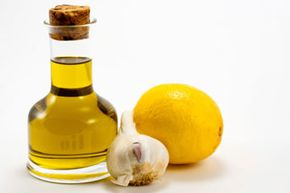Michael sits in front of his salad congratulating himself on making such a healthy food choice. He's scored a table on the patio at his favorite lunch spot, where a warm breeze and the play of sunlight on his glass of ice water add to his mounting sense of healthy well-being. His bowl of crisp greens is topped with chopped radishes, bell peppers, squash, tomatoes, walnuts and avocado. After topping the works with a quarter cup of chunky blue cheese dressing, Michael sits back and chews contentedly, sure that he's eating a healthy lunch.
Michael is sadly mistaken. In fact, some restaurant salads are notoriously unhealthy. The popular restaurant chain Chili's makes a boneless buffalo chicken salad with 1,150 calories and 80 grams of fat [source: Chili's]. Even a relatively nutritious salad like the one Michael ordered can become an artery-clogging nightmare when topped with a creamy, fattening dressing. Studies show that trans fat raises levels of LDL cholesterol (the bad kind of cholesterol), and higher levels of LDL cholesterol have been linked to heart disease [source: AHA].
Advertisement
Michael would have been much better off choosing an oil-based salad dressing. Oil-based dressings contain more polyunsaturated and monounsaturated fats than saturated fat. These unsaturated or "good" fats have been proven to lower LDL cholesterol. Some oils also contain omega-3 fatty acids, which may reduce the risk of coronary heart disease, as well as a variety of phytochemicals (antioxidants) and beneficial organic compounds [source: FDA]. Other ingredients in oil-based dressings don't disappoint either. Vinegar, citrus and add-ins such as garlic, pureed berries, spices and nuts all contain antioxidants and are purported to have heart-healthy benefits as well.
Read on to learn about the antioxidant properties of oil-based salad dressings.
Advertisement


